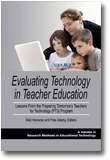
Evaluating Technology in Teacher Education
Lessons From the Preparing Tomorrow’s Teachers for Technology (PT3) Program
Edited by:
Walt Heinecke, University of Virginia
Pete Adamy, University of Rhode Island
A volume in the series: Research, Innovation & Methods in Educational Technology. Editor(s): Chrystalla Mouza, University of Delaware. Nancy C. Lavigne, University of Delaware.
Published 2010
Overall we come away from this project with a renewed sense of the complexity of evaluating the implementation and impact of technology in teacher education. In the post-PT3 period the federal government turned to large-scale experimental and quasi-experimental evaluations of educational technology but these have produced little in the way of understanding what types of technology work in various content areas under various conditions. PT3 and its approach to evaluation can be viewed as the pioneering period of educational technology evaluation in teacher education. It was a time when evaluators were just beginning to develop appropriate standards that could be used as evaluation criteria. It was a time when the accumulated wisdom of the evaluation field with regards to the primacy of mixed methods and multiple indicators of outcomes was just beginning to take hold. PT3 evaluators understood the importance of treading the line between summative and formative evaluation, and the relationship of evaluation to the improvement of educational practice.
In a world where the policymakers now clamor for simple quantitative evaluations linking teacher preparation to pupil achievement scores, we are reminded that the causal chain from teacher preparation to in-service performance and student achievement is fraught with externalities, complexities and a less than equal playing field. Collectively we still have not figured out how technology may be adding value to education beyond any potential impact on superficial standardized test scores. We have as a nation, ignored the call of cognitive psychologists who in 2000 called for a new frame of reference for learner-centered, community-centered , assessment-centered and content-centered educational processes. They understood that the high stakes accountability systems hinder educational innovation and the release of technology's potential to unlock new ways of knowing and learning.
Looking back now on the accomplishments of the PT3 program within our current political context, we see a need for more nuanced evaluation models that examine the relationship between pedagogy and technology integration, with a realization that teacher preparation programs will vary in their approaches to both. Some will focus on skills-based approaches, others on the relationship between pedagogical content knowledge and technology integration. The PT3 program served as an important incubator and test-bed of appropriate evaluation practice; we are already looking back at the program for lessons on how to move forward. We hope this volume may serve as a reminder of lessons for the future.
CONTENTS
Series Editors’ Preface, Walt Heinecke and Pete Adamy. Risk-
Taking in Schools of Education: Teaching New Tricks to Old Dogs, Saul Rockman. Transforming Teacher Preparation Through Technology, Donna M. Mertens. Evaluating the Quality and Impact of a Faculty Development Model: The SUNRAY Experience, Elizabeth Byrom. Using the Technology Learning Cycle as a Framework for Teacher Preparation, Faculty Professional Development, and Evaluation, Jane L. Howland, Judy C. Pfannenstiel, Laura Wedman, and Rose Marra. Lessons in the Evaluation of Educational Technology Programs: A Meta-Evaluation of 1999-2000 PT3 Catalyst Projects, Walter Heinecke and Kirk Knestis. The Appalachian Rural Teacher Technology Alliance, Susan Renc-Walker, Lisa Shuskey, and Richard Riedl. High-Tech Mentoring: Evaluating the Impact of a PT3 Project, Debra Sprague, Jane Cooper, and Cynthia Pixley. Captured Matter: Using Web-Based Informatics for Evaluation of Educational Reform Projects, Matthew J. Stuve, Jerrell C. Cassady, Laurie J. Mullen, and Jody S. Britten. The Evaluation of Project START: Formative Evaluation and Multimethod Design, Andrew Hess and Cheryl Lani Juárez. The Integration of Evaluation into the University of Pittsburgh PT3 Project, Shirley Campbell, Brian Yoder, and R. Tony Eichelberger. The Influence of PT3 Initiatives on Methods Courses and Field Experiences, Drew Polly, Cliff Mims, Fethi Inan, and Craig Shepherd. About the Authors.
-
Paperback978-1-60752-134-1
Web price: $45.04 (Reg. 52.99)
-
Hardcover978-1-60752-135-8
Web price: $80.74 (Reg. 94.99)
- eBook9781617350856

-
 Constructivist Instructional Design (C-ID)
Foundations, Models, and Examples
Constructivist Instructional Design (C-ID)
Foundations, Models, and Examples
-
 Evaluating Electronic Portfolios in Teacher Education
Evaluating Electronic Portfolios in Teacher Education
-
 Frameworks for Integrated Project-Based Instruction in STEM Disciplines
Frameworks for Integrated Project-Based Instruction in STEM Disciplines
-
 Preparing Pre-Service Teachers to Teach Computer Science
Models, Practices, and Policies
Preparing Pre-Service Teachers to Teach Computer Science
Models, Practices, and Policies
-
 Professional Development for In-Service Teachers
Research and Practices in Computing Education
Professional Development for In-Service Teachers
Research and Practices in Computing Education
-
 Research on Technology in English Education
Research on Technology in English Education
-
 Research on Technology in Social Studies Education
Research on Technology in Social Studies Education

